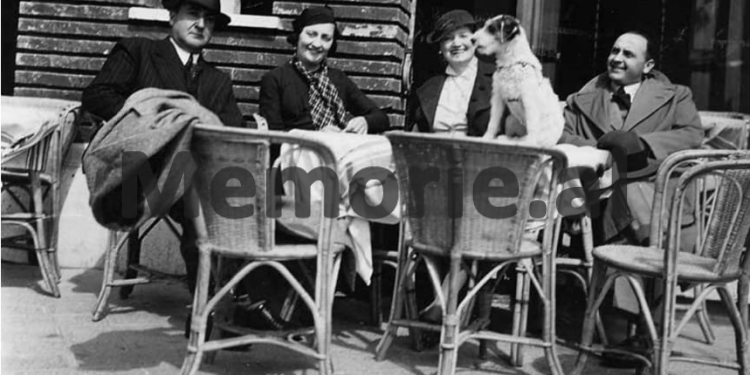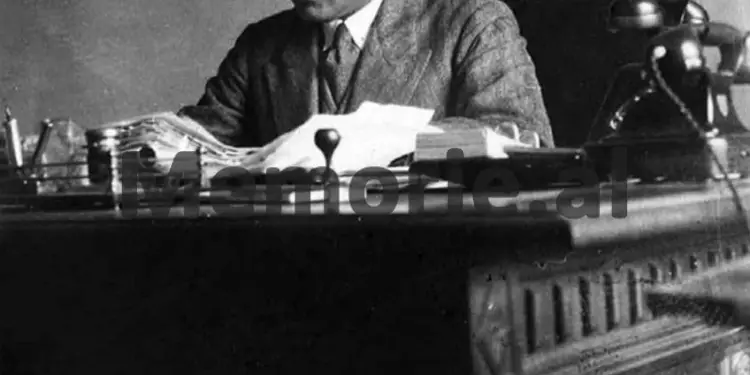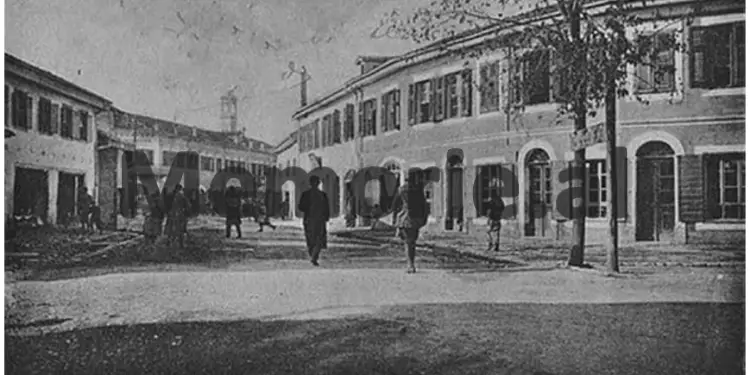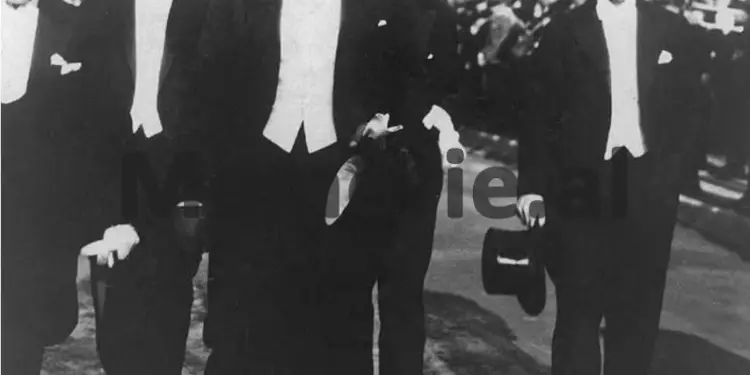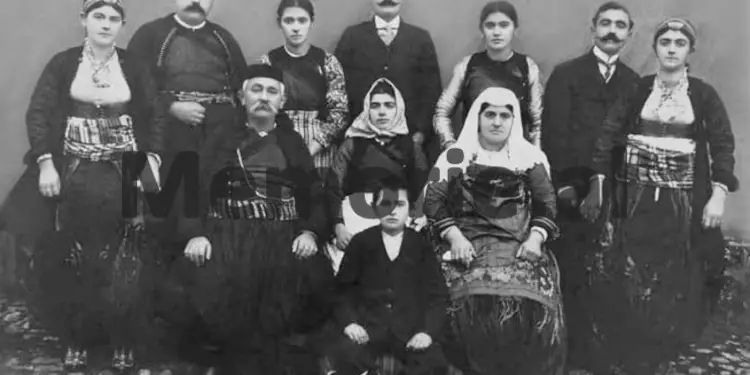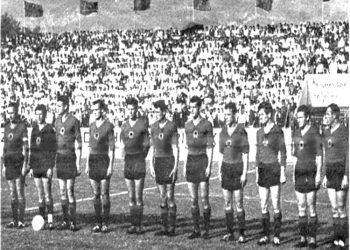By Arben Pustina
The fifth part
– Rrok Gera, a proper statesman –
FORWARD
Memorie.al / This book aims to convey to the public the image of a perfect man, who lived in other times, but who was the best example, not only of what an ordinary man can represent, but, next first, as an example of a noble, distinguished, omniscient and, above all, honest statesman. Having in his genes the noble virtues of his origin, being formed as a personality in a wonderful environment, such as Shkodra at the beginning of the 20th century, and graduating from one of the most prestigious universities in Europe, such as that of In Vienna, Rrok Gera had all the potential to be one of the important figures who gave rise to a rapid development through comprehensive reforms in Albania in the 30s of the last century.
This development reached its peak with the government of Mehdi Frashër, considered perhaps the best Albanian government of all time, formed for the most part by non-political persons, among who was Rrok Gera. For 10 years, or more, as a minister or in other high state functions, he worked with conviction that he was walking on the right path for the consolidation of the Albanian state, a process for which he said he had no time to lose. Economist, financier, diplomat, lawyer, Gera was a specialist who advanced towards the top with his professionalism in an environment where the old factions, which were almost dominant in politics and governance, lost ground in front of young and educated people good.
Continues from last issue
RETURN TO ALBANIA AND ACTIVATION IN THE STATE ADMINISTRATION
From the end of September 1931, Rrok Gera was assigned to inspect the agency of the S.I.T.A. society. in Kavaje. In the detailed report dated 09.10.1931, with no. protocol 6353/I, and bearing the note “In evidence for the new budget”, the General Secretary of the Ministry of Finance noted that, after inspecting the salt pans and salt warehouses in Kavaja for three days, he found that the procedures carried out by the state employee near the salt warehouses, as well as by the agent of the company S.I.T.A., were generally not abusive, so there was no activity to the detriment of the state. After having thoroughly checked everything in the activity of S.I.T.A. in Kavaja, Rrok Gera, meanwhile, emphasized that, for various reasons, there was a possibility that the salt was weighed incorrectly when entering and leaving the salt pan, or that it was stolen at night, when it was in the plow or in warehouses, which were closed with old padlocks.
In his 6-page report, Gera suggested the addition of a civil servant to the premises of S.I.T.A., the addition of measures for the safety of the goods as well as the improvement of documentation, especially of the consignment notes issued by the salt works. Through a letter from the Central Directorate of the National Bank of Albania, addressed to the Delegate Advisor of the National Bank of Albania, Amedeo Gambino, we learn that in the first months of 1935, Rrok Gera was tasked by the Minister of Finance to deal with the project for the organization of the state monopoly on tobacco.
In this letter, Ettore Melis confirmed that Mr. Gera himself had confirmed this to him. At that time, the Italian leaders of the BKSh and the Italian financial circles were worried about the possibility of the British taking over the tobacco concession in Albania, so they liked the idea of the state having a tobacco monopoly in Albania. Confirming the general assessment of the time for Rrok Gera’s professional abilities, at the meeting of January 28, 1932, the Council of the League of Nations, based in Geneva, elected him “Corresponding Member” of its Fiscal Committee, a structure in which not all countries had their own representative. At the time that Rrok Gera was a correspondent member of the Fiscal Committee, this permanent committee had 10 regular members and 36 correspondent members from as many member countries of the League of Nations, including Albania.
In most cases, these members were among the most important officials of the financial and tax structures in the respective countries. Gera continued to be a corresponding member of the Fiscal Committee of the League of Nations until April 1939. At the beginning of 1934, the Council of Ministers made the decision to appoint Rrok Gera as State Deputy Commissioner at the National Bank of Albania. According to decision no. 96 dated 28.02.1934, Gera kept his original position as General Secretary of the Ministry of Finance and meanwhile represented the Albanian government to the Bank in question, according to the provisions of the organic law and its statute.
The concern of the Italians about this appointment was immediately reflected in the letter of the Central Directorate of the Central Bank of the Bank with headquarters in Rome, dated March 15, 1934, in which it was emphasized to the leaders of the Bank in Tirana that they definitely accepted the appointment of Rrok Gera in the position of the Mayor near this Bank, but in the meantime they drew attention to the fact that, based on the article of the Organic Law of the Central Bank, for no reason, the newly appointed could not interfere in the management of various issues, or in the administration of the Bank. On February 25, 1935, Rrok Gera married Gjyljeta, the daughter of a well-known merchant in Shkodër; Lec Shkreli.
She attended a college in Dubrovnik for eight years, where she received a comprehensive education. Raised in luxury, Gjyljeta was a very intelligent, elegant and classy woman. She spoke Serbo-Croatian, Italian and German very well, knew world literature perfectly, painted, played the piano, swam well and was famous for her culture. As Gera himself told, during a diplomatic table, organized after the marriage, the Croatian ambassador shook his hand and congratulated him, saying that Mrs. Gera spoke the Serbo-Croatian language better than he himself, who was the ambassador of Croatia. From this marriage, the Gera couple had two daughters.
MINISTER OF FINANCE IN THE GOVERNMENT OF MEHDI FRASŞERI
In the autumn of 1935, King Zog considered forming a new, relatively liberal government under the leadership of Mehdi Frashër, in a move that was seen as a meaningful attempt to break away from past politics. Mehdi Frashëri was a personality who, for many years, had been Albania’s representative in the League of Nations and who was known for his progressive ideas as well as his honesty. Instead of the ministers of the previous cabinet, in the government headed by Frashër, came a group of ministers who were young in age, but who were well educated and had the will to make reforms.
After several years of work in the Ministry of Finance, where most of the time he held the position of General Secretary, Rrok Gera was appointed part of this new governing cabinet. On October 21, 1935, he was appointed Minister of Finance in the “youth” government, headed by Mehdi Frashëri, together with some of his schoolmates in Vienna, such as: Fuat Asllani, Nush Bushati, Ndoc Naraçi and Anton Ukraine. On 21.10.1935, Prime Minister Frashëri himself officially notified Gera of his new position: Mr. Rrok Gera, Minister of Finance Tirana I have the honor to inform you that His Majesty the King, Our Sovereign Augustus, decreed the elimination of Mr. Suej, as Minister of Finance.
The relative decree is sent to you herewith and please starts the task assigned to you, from today. PRIME MINISTER. Upon being appointed to the new position, Gera received numerous congratulations, among which was that of Father Gjergj Fishta. He responded to this greeting from Tirana with a telegram dated 23.10.1935, which also coincides with the birthday of our great poet: “To the Provincial of the Franciscans! Grateful for hearty congratulations I beg you to accept my special respects with many friendly greetings. Rrok Gera”. While presenting the government’s program on the anticipated reforms, Prime Minister Frashëri declared, among other things: “…One of the main goals of the government, which I have the honor to lead, is the improvement of the economic and financial situation…”.
After stressing that it was time for the government to take measures to change the situation in these sectors, Frashëri presented 16 draft laws, accompanied by the corresponding justifying reports. The projects for finance were as follows: 1. the transformation of the give it to me tax into a consumption tax on meat. 2. Modification of the law of tithing. 3. Modification of the bond on real estate. 4. Modification of fishing tax. 5. Monopolization of tobacco. 6. Monopolization of alcoholic beverages. 7. Exemption from customs taxes of some items used for the manufacture of cheese.
It is understood that these projects, already distributed by the Prime Minister in different departments, in the State Council, in the Parliament and in the press, were expected to be the focus of the work of the new Minister of Finance, Gera. Sometime later, in his memoirs titled “Albanian Problems”, Mehdi Frashëri wrote: “First of all, the financial system of the state had to be reformed in a way that the incomes would gradually develop, so that they could cope with all the needs that a high civilization begs for.
State finances are similar to the stomach of a body, if the stomach does not work normally in a body, the weakness of other organs is immediately visible, this also leads to anemia, and anemia causes bad cough and other diseases that lead to the death of a person. For this reason, we are starting from the financial reforms and therefore we will come to other branches of state work. In 1935, when I came to power, the first thing I considered was the improvement of finances…! From what Mehdi Frashëri writes, we understand that the election of Rrok Gera in charge of finance was a great assessment, since Mehdi Bey saw him as the right man for undertaking comprehensive reforms in the financial system. Meanwhile, the new government was greeted with great sympathy throughout the country. About the new government cabinet, the newspaper “Vatra” wrote in its issue of October 22, 1935 that: “The impression on the opinion of Tirana about the new cabinet is extremely good. One finds everywhere a pleasure that cannot be described.
For everyone without exception. The young age of the young ministers is a conviction for their attitude, an attitude for the good of this people that is so good and has been so despised…”! Even the newspaper “Illyria”, in its pages of the issue of October 26, 1935, conveyed the popular enthusiasm for the new government:… “The formation of the Frashëri Cabinet produced a great satisfaction in the capital and in all of Albania…. to note, that this Cabinet is “extra-parliamentary”, for the reason that none of the Ministers is an MP, except Mr. Nush Bushati”.
Describing the creation of the new government as the expected oppression of the young over the old, “Minerva” wrote in its main article that the time of a new reality had finally come, which overthrew the old and dispelled the darkness: ..“We were a little confused by the new scene, by the new reality. Accustomed to darkness, the light of the new day blinded us. The world that fell, the world that started from the graves, fled wrapped in its silk mantles, laughing, crying and shining its yellow and rotten teeth. He runs away, he runs away to hide, he is afraid to be seen in the middle of nowhere. The heated shouts of the people made him sick. They will slowly die altogether.”
The enthusiastic atmosphere created immediately after the formation of the new government is also described in the memories of one of the British officers who dealt with the organization of the Albanian gendarmerie in the 1930s, Colonel Oakley Hill: “The public was immensely pleased, thinking that a new wind had come. I knew most of the ministers and enjoyed visiting them…!
Everyone could feel that they wanted to get rid of the old ways and really turn things around for good. This was a happy year…”. The Frashëri cabinet was also rated highly by the historian Vandeleur Robinson, in his book “Albanian Road to Freedom”: “The prime minister was Mehdi Frashëri, an early idealist, while the ministers were young people in government. , who were now being given a chance for the first time.
They represented a more modern tendency and a generation that had not inherited the ideas of the Turks… However, by competent observers who have lived in Albania, it has been affirmed that the Frashëri cabinet was the best that Albania had ever had. … Frashër’s idealism and his team of young people, who were not related to the Sultans and who were smart, competent and honest, brought a breath of fresh air to the leadership of Albania and led to an improvement of significantly in the practice of daily governance…”! Likewise, the Italian leaders of the National Bank of Albania had their own comment on the formation of the Frashëri cabinet:
“…The formation of the new Cabinet can also be considered as a manifestation of the tendency for an Italian-Albanian rapprochement, but above all it means a demonstration of internal politics, for a purification of all elements with a Turkish physiognomy, which also why are they not really Turks, they are always, more or less, exponents of the same system…”, was written in the letter of October 21, 1935, addressed to the delegate advisor of the BKSh in Rome, Amedeo Gambino. The formation of the new government cabinet in Albania had a great echo in the foreign press, which was not enough just to announce the creation of the new cabinet.
Thus, in its issue of November 14, 1935, the newspaper “Vatra” forwarded the article of the French newspaper “Journal des Debasts”, in which it was written about the reforms that had begun to be undertaken in Albania: “…The Frashëri Cabinet has started a series reforms. The Frashëri cabinet, made up of young people, and mostly foreign functionaries in the politics of the parties, will especially try for internal calm and peace. Also, as far as administration is concerned, Mr. Frashëri, a former member of the State Council (as is known, he led the drafting of the Albanian Civil Code), has taken a number of measures regarding the administrative organization of the Kingdom. A complete review of the laws on the recruitment of civil servants is due at once; male and female candidates, from any social status, can participate in state competitions…”.
But in complete contrast to this hospitable and benevolent spirit that we have quoted so far, was the atmosphere in the Parliament of the country where, on the occasion of an interpellation with the Prime Minister, held on January 13, 1936, some deputies vented their anger towards the new government cabinet and the fiery debates went so far that, according to the press of the time, the debaters “put their hands on the floor” and “almost played their fingers”. Specifically, the incident started after someone spoke about Mehdi Frashëri’s republicanism, as well as asked questions about why all those demonstrations were held for the new government and why it was considered “liberal”.
After assuming the office of minister, on 24.10.1935, Rrok Gera addressed all the heads of finance and customs offices in the districts with a circular telegram, asking for their cooperation and warning, meanwhile, that there would be no tolerance for evasions, violations, abuses, or non-commitment to duty: “…The high task that His Majesty the King was kind enough to entrust to me to lead the Finance Department, I wish to carry out in close cooperation with the God of Way and with all the employees and other personnel to be dependent on Way.
As you know very well, the principle of our Sovereign Augustus is justice, apply the laws of the state well for everyone, clarity and precision in actions, showing good results and at the right time as a sign of performing the duty in an orderly manner. Quickly, study and work tirelessly, relentless pursuit of fiscal abuses. I therefore ask Mr. S’Uej to communicate to all the staff that a deviation from this principle will not be tolerated in any way.
The certifications and releases and other actions have been checked by me mainly from the point of view of personal responsibility because it is your fault since the flawed actions stem from illiterate or illiterate employees, whom you have never reported. I would therefore be sorry if our cooperation in these cases suffered any shock. On the contrary, I am convinced that under the careful leadership of Vej, every employee will carry out his duties properly and thus the smooth functioning of the financial administration will be ensured. Memorie.al
The next issue follows




